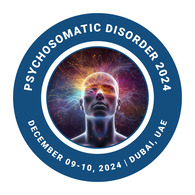Call for Abstract
Scientific Program
5th International Conference on Psychosomatic Medicine and Disorders, will be organized around the theme “Transforming Psychiatry Innovations and Global Challenges”
PSYCHOSOMATIC DISORDER 2024 is comprised of keynote and speakers sessions on latest cutting edge research designed to offer comprehensive global discussions that address current issues in PSYCHOSOMATIC DISORDER 2024
Submit your abstract to any of the mentioned tracks.
Register now for the conference by choosing an appropriate package suitable to you.
Investigate functional neurological disorders, where psychological factors play a significant role in the manifestation of neurological symptoms. Review diagnostic challenges and treatment approaches for these complex conditions.
Discuss emerging trends and future directions in psychosomatic research. Highlight innovative approaches, technologies, and areas of study that hold promise for advancing the understanding and treatment of psychosomatic disorders.
Explore how psychological factors can contribute to gastrointestinal disorders, such as irritable bowel syndrome (IBS). Review diagnostic and treatment approaches that address both psychological and gastrointestinal symptoms.
Examine the impact of trauma on the development and progression of psychosomatic disorders. Discuss therapeutic approaches for addressing trauma and its effects on physical health.
Investigate the use of biofeedback and psychophysiological techniques in managing psychosomatic disorders. Review how these methods can help patients gain control over physiological processes and improve their overall well-being.
Explore how cultural beliefs and practices influence the perception and management of psychosomatic disorders. Discuss the importance of cultural sensitivity in diagnosis and treatment.
Analyze the phenomenon of somatization in children, including how psychological factors can manifest as physical symptoms in young patients. Discuss diagnostic considerations and management strategies for pediatric somatization.
Examine the relationship between sleep disorders and psychosomatic health issues. Discuss how poor sleep can exacerbate psychosomatic symptoms and review treatment options that address both sleep and psychological health.
Explore how psychosocial factors, such as stress and social support, impact cancer progression and patient outcomes. Discuss strategies for addressing these factors in cancer care to improve patient quality of life.
Discuss integrative approaches that combine psychological and medical treatments for psychosomatic disorders. Highlight case studies and evidence supporting the efficacy of holistic treatment plans.
Explore how mental and emotional states can influence physical health, highlighting key theories and research in psychosomatic medicine. Discuss the interplay between psychological factors and physical symptoms, and the implications for diagnosis and treatment.
Explore how psychosomatic factors can influence autoimmune diseases, including the role of stress and psychological trauma in disease onset and progression. Discuss approaches for managing autoimmune conditions with a psychosomatic perspective.
Examine the impact of psychological factors on cardiovascular health, including how stress, anxiety, and depression can contribute to cardiovascular diseases. Review strategies for integrating psychological care into cardiovascular treatment.
Discuss the gut-brain axis and its role in psychosomatic illness, including how gastrointestinal health can affect mental well-being and vice versa. Explore current research on the bidirectional communication between the gut microbiome and brain function.
Provide an overview of somatic symptom disorders, including their diagnostic criteria and management strategies. Highlight the importance of a comprehensive approach that incorporates both psychological and medical perspectives.
Explore how various emotions, such as depression and anxiety, can manifest as physical illnesses. Discuss the mechanisms through which emotional states can influence physical health and approaches for addressing these connections in clinical practice.
Investigate the effectiveness of mindfulness and Cognitive Behavioral Therapy (CBT) in treating psychosomatic disorders. Review evidence supporting these therapies in managing symptoms and improving patient outcomes.
Analyze the intersection of chronic pain and somatic disorders, including the psychological factors that contribute to persistent pain. Discuss diagnostic challenges and integrative treatment approaches combining psychological and physical therapies.
Delve into the field of psychoneuroimmunology, which studies how psychological processes affect the immune system. Discuss the bidirectional communication between the mind and immune response and its implications for chronic illness and disease prevention.
Examine the relationship between chronic stress and its impact on physical health, including its role in exacerbating conditions such as hypertension, diabetes, and cardiovascular diseases. Review strategies for stress management and its importance in overall health maintenance.

